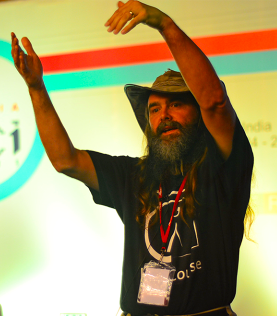|
abstract
Walking has long been an instrument of political activism, such as the Jarrow March in Britain and the Salt March in India in the 1930s, and before that of war. It has been a spiritual practice, a source of literary inspiration and in some cases regarded as an art in itself. In the case of psychogeography, the act of walking is an integral part of academic and philosophical practice. However, it is fair to say that walking is not a typical part of HCI research methodology.
From mid-April to the end of July this year, I walked the perimeter of Wales, a distance of 1058 miles (1700 km). This was partly a personal journey encircling the country of my birth, not without overtones of pilgrimage, certainly a symbolic act, and maybe, depending on your definitions, art. It was also a research journey, seeking to understand the social and community issues of the 'margins' (literally and metaphorically) of a modern nation, including the impact or otherwise of information technology. This layering of aims and approaches could be regarded as post-modern, but I preferred the words of the Dean of Cardiff School of Art and Design, who described the methodology as mediaeval, and subsequently the blog about the walk was compared with the writing of Gerald of Wales written in 1188.
In this talk I will explore some of the things I have learnt from this perambulatory research; we will consider the design of mobile technology, the meaning of community, and the role of the subjective in academic study.
However, the 'results' of this are as much questions as answers. Remote rural communities in Wales, and no less in India and the rest of the world, often face a deepening, fuelled by the digital revolution, of the existing social and economic divides. Can appropriate design and policy counter the apparently inevitable technological entrenchment of existing power? Methodologically, is there a role for this level of slow-paced physicality and ethically is there a place for physical pain?
Finally a critical aspect of the walk has been its permeability. I laid myself open to others as a living lab, and the data gathered is being made available to the entire research community. It started as my journey, but one of the first tangible outcomes is a digital exhibition by others, inspired by, but not 'about', the walk. Just as the act of walking collapses the distinction of places into a threaded narrative of journey, is there also a space for research that defies the discretisation of publications as metricised outputs, and the cabalistic disintegration of disciplines and groups, a space for methods of work that link, join, and lay themselves open to use by all?
